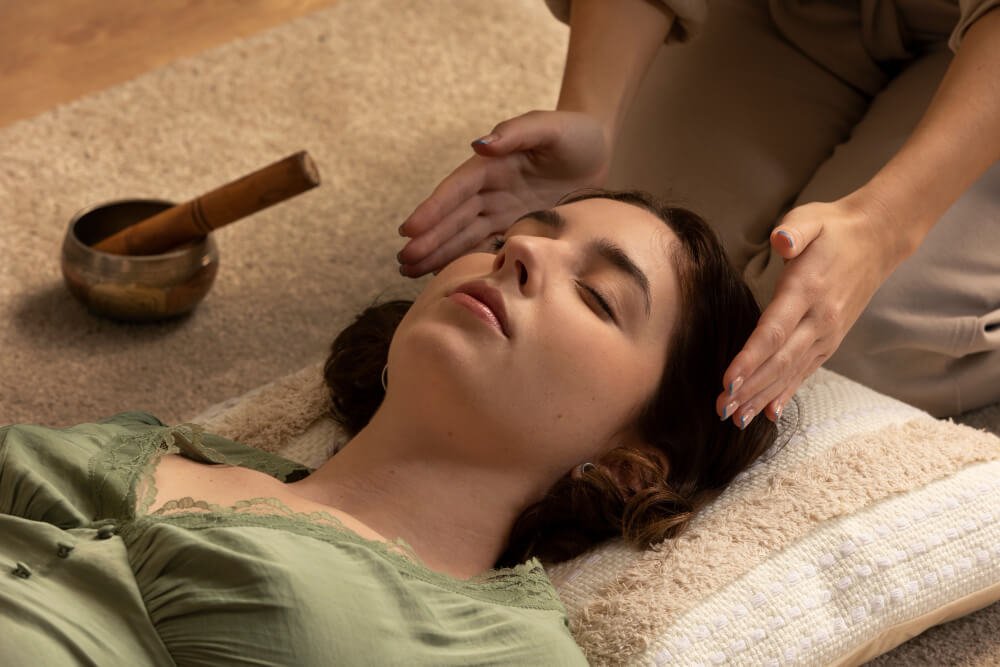Understanding Reiki and Its Benefits

Ever heard of Reiki? It sounds mystical, doesn’t it? Reiki is a form of energy healing that originated in Japan. The word “Reiki” comes from the Japanese words “rei” (meaning universal) and “ki” (life energy). So, Reiki essentially means “universal life energy.”
This practice involves the transfer of energy through the practitioner’s hands to the patient, aiming to balance the energy within the body and promote healing. It’s like a gentle, non-invasive touch therapy that many people find incredibly soothing and beneficial.
How Does Reiki Work?
You might be wondering, “How does this hand-waving thing actually work?” Well, let’s dive into that. Reiki practitioners believe that energy can get blocked in our bodies, leading to physical, mental, or emotional issues. By channeling energy into the body, these blockages can be released, allowing the energy to flow freely again.
During a Reiki session, you typically lie down fully clothed while the practitioner places their hands lightly on or just above various parts of your body. Each hand position is held for a few minutes, directing healing energy to where it’s needed most. It’s a bit like giving your body a spiritual tune-up.
The Benefits of Reiki
Alright, now let’s get to the good stuff – the benefits of Reiki. People who have experienced Reiki often report a variety of positive effects. Here are some of the most common benefits:
Stress Reduction and Relaxation
One of the most touted benefits of Reiki is its ability to promote deep relaxation. Imagine a wave of calm washing over you, easing your stress and tension. That’s what many people feel during and after a Reiki session. This relaxation can help reduce anxiety and improve overall mental clarity.
Improved Sleep
If you’re having trouble catching those Zs, Reiki might be just what you need. The deep relaxation induced by Reiki can improve sleep patterns. Many people find that they sleep more soundly and wake up feeling more refreshed after a session.
Pain Relief
Reiki is often used as a complementary therapy for pain management. It doesn’t replace medical treatment but can be an excellent addition. People with chronic pain, migraines, or even post-surgery discomfort have reported relief after Reiki sessions.
Emotional Healing
Emotions can be tricky. Sometimes, we carry around emotional baggage that weighs us down. Reiki can help release these emotional blocks, promoting emotional healing. Whether you’re dealing with grief, anger, or any other strong emotion, Reiki can provide a sense of peace and emotional balance.
Enhanced Well-Being
Overall well-being is a big deal. When your energy is balanced, you feel better physically, mentally, and emotionally. Reiki can enhance your overall sense of well-being, making you feel more vibrant and alive.
Reiki and Your Everyday Life
So, how does one incorporate Reiki into daily life? It’s simpler than you might think. While regular sessions with a practitioner can be incredibly beneficial, you can also practice self-Reiki. Learning some basic techniques allows you to give yourself a mini session whenever you need a boost.
Finding a Reiki Practitioner
If you’re interested in trying Reiki, finding a qualified practitioner is essential. Look for someone who is certified and has good reviews. It’s important to feel comfortable with your practitioner since a good connection can enhance the effectiveness of the session.
Self-Reiki Tips
For those interested in self-Reiki, here are a few tips to get you started:
- Create a Calm Space: Find a quiet place where you won’t be disturbed. Light a candle or play some soft music to create a relaxing atmosphere.
- Set an Intention: Before you begin, set a clear intention for your session. It could be something like, “I am open to receiving healing energy.”
- Focus on Your Breath: Take a few deep breaths to center yourself. Breathe in through your nose and out through your mouth, letting go of any tension.
- Hand Positions: Place your hands on different parts of your body, starting from your head and moving down to your feet. Hold each position for a few minutes, visualizing the energy flowing through you.
- Practice Regularly: Like any practice, the more you do it, the better you’ll get. Try to incorporate self-Reiki into your daily routine, even if it’s just for a few minutes.
Reiki Myths Debunked
There are a few myths about Reiki that we should clear up. One common misconception is that you need to have a specific belief system for it to work. The truth is, Reiki is not tied to any religion or belief system. It works regardless of your spiritual or religious background.
Another myth is that Reiki can cure illnesses. While Reiki can support healing and promote well-being, it is not a substitute for medical treatment. It’s best used as a complementary therapy alongside traditional medical care.
What to Expect During a Reiki Session
If you’re new to Reiki, you might be curious about what happens during a session. Here’s a simple breakdown of what you can expect:
Before the Session
- Consultation: Your practitioner will usually start with a brief consultation to understand your needs and any specific areas you want to focus on.
- Setting the Mood: The room will be calm and quiet, often with dim lighting, soft music, and possibly some pleasant scents like lavender or sandalwood.
During the Session
- Comfortable Position: You’ll lie down fully clothed on a comfortable table or sit in a chair.
- Hand Positions: The practitioner will place their hands lightly on or just above your body in a series of positions, starting from your head and moving down to your feet.
- Sensation: You might feel warmth, tingling, or a gentle pulsing under the practitioner’s hands. Some people even fall asleep because it’s so relaxing.
After the Session
- Feelings: Many people feel deeply relaxed, and some report feeling light or even euphoric.
- Hydration: It’s a good idea to drink plenty of water to help your body process the energy shifts.
Exploring Reiki Levels and Attunements
For those who want to dive deeper into Reiki, there are different levels of training, each with its own attunements and skills.
Level 1: The Beginner
- Self-Healing: At this level, you learn how to heal yourself and close friends and family.
- Hand Positions: You’ll get familiar with the basic hand positions and learn how to channel energy effectively.
Level 2: The Practitioner
- Distance Healing: Here, you’ll learn techniques for sending Reiki across distances and to different times.
- Symbols: You’re introduced to sacred symbols that enhance the energy flow and focus during sessions.
Level 3: The Master
- Master Symbol: You learn the master symbol, which significantly boosts the energy you can channel.
- Teaching: You’re trained to attune others and teach Reiki, passing on your knowledge.
Level 4: The Master Teacher
- Advanced Techniques: You dive into more advanced healing techniques and deepen your understanding.
- Mentorship: You start mentoring new practitioners, guiding them through their Reiki journey.
Combining Reiki with Other Therapies
One of the great things about Reiki is its flexibility. It can be easily combined with other healing modalities to enhance their effects. Here are a few examples:
Massage Therapy
- Enhanced Relaxation: Adding Reiki to a massage session can deepen relaxation and release muscle tension more effectively.
- Energy Flow: Reiki can help ensure that the energy released during a massage is properly balanced and integrated.
Acupuncture
- Boosting Effects: Reiki can complement acupuncture by enhancing the flow of energy through the meridians.
- Emotional Balance: It can also help with the emotional releases that sometimes occur during acupuncture sessions.
Yoga
- Deepening Practice: Practicing Reiki before or after yoga can deepen your meditation and enhance the physical benefits of your yoga practice.
- Balance: It can help maintain the balance of energy that yoga promotes within the body.
Real-Life Stories of Reiki Healing
Hearing about others’ experiences can be inspiring and reassuring. Here are a few real-life stories from people who have benefited from Reiki:
Sarah’s Stress Relief
Sarah, a busy mom of three, found herself constantly stressed and on edge. After a few Reiki sessions, she noticed a significant reduction in her stress levels. She now incorporates self-Reiki into her nightly routine, which has helped her manage her day-to-day stress more effectively.
Tom’s Pain Management
Tom, who suffers from chronic back pain, was skeptical about Reiki at first. But after a friend’s recommendation, he decided to give it a try. To his surprise, he found that his pain was more manageable, and he felt a sense of overall well-being that he hadn’t experienced in years.
Emma’s Emotional Healing
Emma had been struggling with unresolved grief for years. Through Reiki, she found a safe space to release her emotions. The gentle energy helped her process her feelings and move forward with a lighter heart.
How to Learn Reiki
If you’re interested in learning Reiki, there are plenty of resources available:
Workshops and Classes
- Local Workshops: Check out local wellness centers for Reiki workshops and classes. These often provide hands-on training and personal guidance.
- Online Courses: There are numerous online courses available if you prefer to learn at your own pace. Look for certified instructors with good reviews.
Books and Guides
- Beginner Books: Books like “The Reiki Manual” by Penelope Quest and Kathy Roberts offer comprehensive guides for beginners.
- Advanced Reading: For those who want to go deeper, “The Spirit of Reiki” by Walter Lübeck, Frank Arjava Petter, and William Lee Rand provides more advanced insights.
Practice Groups
- Join a Group: Many communities have Reiki practice groups where you can connect with other practitioners, share experiences, and continue learning.
- Online Communities: Websites and forums dedicated to Reiki can be great places to find support and further your knowledge.
Conclusion
Reiki is a gentle yet powerful healing practice that can benefit anyone looking to improve their physical, emotional, and spiritual well-being. Whether you’re seeking stress relief, pain management, emotional healing, or just a greater sense of balance, Reiki offers a pathway to a healthier and more harmonious life. So, why not give it a try? You might just find that it opens up a whole new world of healing and self-discovery for you.



